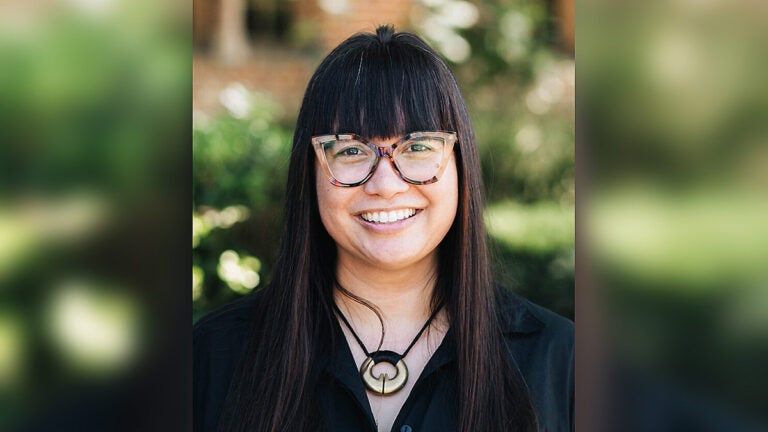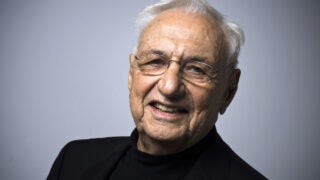
Vanessa Gomez Brake does not practice any religion: She is a self-identified atheist — or secular humanist, as she prefers. (Photo/Courtesy of Vanessa Gomez Brake)
USC’s Vanessa Gomez Brake named national university Chaplain of the Year
The Association for Chaplaincy and Spiritual Life in Higher Education recognized the senior associate dean of religious life — the first humanist in U.S. history to serve in that position.
As someone who has extensively studied and worked alongside practitioners of most major religions, USC Senior Associate Dean of Religious Life Vanessa Gomez Brake always knew she needed to work in a place where she could put her knowledge and curiosity to the best use. To Gomez Brake, that place could only be USC.
In her current role, she supports and promotes university religious and spiritual life-related programming and helps oversee more than 90 student religious groups and 50 religious affiliates on campus.
Unlike most religious or spiritual leaders, Gomez Brake is not a practitioner of any religion. She is a self-identified atheist — or secular humanist, as she prefers. That’s why she said she needed to be in a university setting: There’s an atmosphere of curiosity and an openness that she says nurtures her own spiritual journey.
“I joke with other atheists that the university is our sacred place,” said Gomez Brake, who received her doctorate in education from the USC Rossier School of Education. “Where else do you go to in the pursuit of knowledge and truth?”
That’s another reason why she believes USC was the perfect fit.
“We think that it is a universal experience for humans that they are on a spiritual journey, or if spiritual isn’t the word, they are on a journey of meaning-making,” Gomez Brake said. “We understand that everyone has a need for meaning-making in their lives, especially during difficult times like right now, and that sets us apart from a lot of offices across this nation.”
That approach has resonated beyond USC. In February, the Association for Chaplaincy and Spiritual Life in Higher Education named Gomez Brake as Chaplain of the Year. The organization formally presented her with the award at its annual conference in Washington, D.C.
“I knew that this organization gives awards every year, but I didn’t realize that a number of people have to nominate me, so that was a nice surprise,” Gomez Brake said. “I’ve received awards in the past, but this one is particularly special, because it is from my peers in the field of university chaplaincy, and an organization that represents religious professionals in higher education institutions across the United States.”
Chaplain of the Year: An endorsement of her peers
According to the Association for Chaplaincy and Spiritual Life in Higher Education, the Chaplain of the Year Award honors a higher education chaplain who has made a significant contribution to the field on campus and nationally. Started in 2020 as a merger between the National Association of College and University Chaplains and the Association of College and University Religious Affairs — the latter founded in 1959 by religious life staff from Big Ten universities — the association is the leading authority on religious and spiritual life in higher education.
Varun Soni, USC’s dean of religious life, says the recognition is well-deserved.
“Vanessa’s contributions are too numerous to list, and her impact is too great to quantify,” Soni said. “I’ve been in this field for almost 20 years, and Vanessa is the best I’ve ever seen.”
Soni said her creative approach to ministry and chaplaincy offers a national model for the future of religious life in higher education.
“She’s also a national figure and helps lead important religious, academic and cultural arts organizations outside of USC,” he said.
Gomez Brake — the first humanist to be a top religious leader at a college or university — says that the faith that Soni had in her when she joined USC in 2017 was the vote of confidence she needed.
“Varun’s been one of my biggest fans and mentors,” said Gomez Brake, who also is an advisor to the university’s Interfaith Council and Secular Student Fellowship. “USC needed someone who could navigate this new landscape of religious life, and I think that probably gave me an edge.”
Path to chaplaincy for the Chaplain of the Year
Raised in a Catholic Filipino household, Gomez Brake said she became an atheist in her early teens. However, she still considers herself to be “culturally Catholic.”
“As a Filipino, it’s really hard to separate those two identity pieces,” she said. “Although I lost my belief at a very young age, I’ve always been curious about religion, and that’s why I dedicated my studies, research and career to better understanding the world’s religions.”
Her undergraduate education at Arizona State University sparked her passion for interfaith dialogue and cemented her status as a humanist — a philosophy that values human potential through reason and science, rather than religious dogma. After Arizona State, she received a Master of Science degree in conflict analysis and resolution from George Mason University in Fairfax, Va.
“I loved that I got to hang out with people of every religious tradition and background,” she said of her time as a student. “There’s this saying in South Africa called ‘Ubuntu,’ and it means you can really only know yourself through others. I believe interfaith is just that — if you’re going to truly know yourself and your faith, you have to be able to engage people who don’t share in your beliefs.”
Eventually, Gomez Brake started working at an interfaith seminary in Berkeley, where people train to be chaplains. Gomez Brake admits she had no intention of becoming one.
“I was just really supportive of interfaith work, and I love the context of interfaith learning,” she said.
From there, she took a position with Stanford University’s Office for Religious & Spiritual Life, where she oversaw programming and staff at the historic Stanford Memorial Church; the CIRCLE: Center for Inter-Religious Community, Learning and Experiences; and Windhover Contemplative Center. She then attended the Chicago Theological Seminary, where she earned her Master of Divinity degree, which led her to USC.
“As far as I knew, an atheist had never been a dean of religious life anywhere,” Gomez Brake said. “But USC is special — their first dean of religious life was a rabbi, and their second dean of religious life was Hindu.”
Providing spiritual care for all
Though many traditionalists might balk at the idea of an atheist holding any position in an office of religious life at a major university, Gomez Brake knows her qualifications. She is also aware that as religious identities shift with younger generations, her beliefs and experience put her in line to provide spiritual care to anyone who walks through her door.
“We tend to see a lot of research showing that young adults are unaffiliated — more than half of them are nonreligious,” Gomez Brake said. “So, even though they might be spiritual, they’re just not doing things the old ways. There’s a generational gap in our openness to different spiritual expressions.”
Gomez Brake said that in her experience, students tend to be put at ease by her beliefs, as she does not approach her care from any particular faith.
“The truth is, it does not matter what I believe,” she said. “Many times, it doesn’t even come up because when you are providing care, everything is about the care-seeker.”



